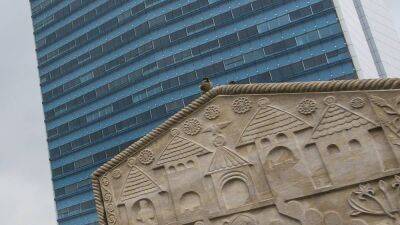'This is climate carnage': UN chief visits Pakistan's flood-ravaged provinces
"We are not living here by choice. Everything we own is underwater," says a rescued villager near Mehar, the latest city to be flooded in Pakistan due to record rainfall and the overflowing Indus River.
Navy volunteers have raced out on lifeboats to deliver aid and ferry people in need of medical care back to the city, while the displaced are now forced to live in makeshift camps.
UN Secretary-General António Guterres completed the second day of a two-day visit to Pakistan on Saturday, which has been devastated by months of heavy monsoon rains and flooding.
At least 1,396 people have been killed, 12,728 injured and millions left homeless. The waters have also destroyed road and communications infrastructure.
I've seen many humanitarian disasters in the world, but I have never seen climate carnage on this scale. I have simply no words to describe what I've seen today. A flooded area that is three times the total area of my own country, Portugal," Guterres said.
"Pakistan needs today massive financial support to overcome this crisis."
"The needs are enormous, and I urge massive and urgent financial support for Pakistan -- and this is not a matter of generosity, this is a matter of justice. Pakistan is paying the price of something that was created by others", he added.
The UN chief toured flood-affected areas of the district of Sukkur in southern Sindh province and Osta Mohammad in southwest Baluchistan province — some of the worst affected areas of the country.
Miles of cotton and sugarcane crops, banana orchards and vegetable fields in the two provinces were submerged in floodwaters.
Thousands of mud and brick homes caved in under the deluge, leaving people homeless and sheltering in tents alongside damaged roads.
Beyond the
Read more on euronews.com

 euronews.com
euronews.com




![Cosmos [ATOM] is gathering steam, but what are the chances of a breakout - ambcrypto.com](https://finance-news.co/storage/thumbs_400/img/2022/10/10/44316_ybgbe.jpg)








![This Bitcoin [BTC] metric is high and whales may have something to do with it - ambcrypto.com - city Santiment](https://finance-news.co/storage/thumbs_400/img/2022/10/10/44306_fruul.jpg)




